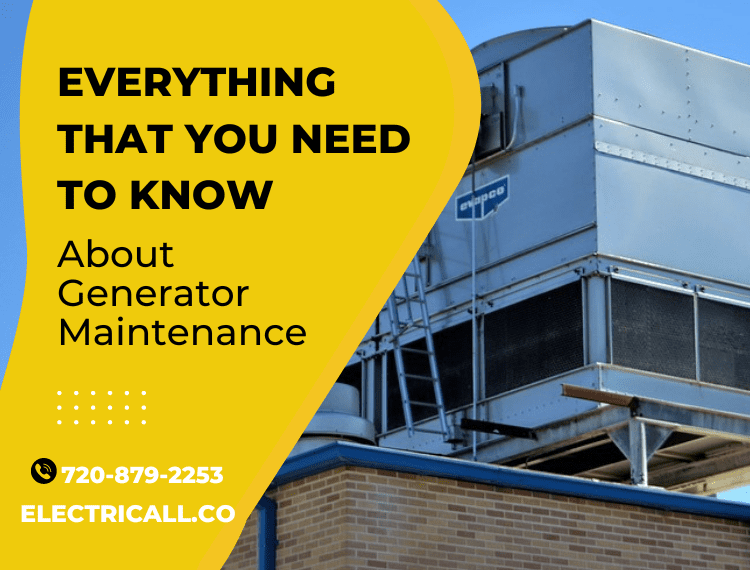
Everything that you need to know about generator maintenance is here. Generators are essential for houses and businesses that are without access to the power grid. You can use them for when the power fails out or even in rural areas that don’t have access to the grid. So, this, in addition to many other features and benefits, makes generators a great investment for any individual or business looking to save money on their energy bills.
However, generators can also be dangerous if not properly maintained and operated. Find out if you have serviced and maintained your generator as it deserves below.
Importance of Routine Maintenance on Your Generator
Everything that you need to know about generator maintenance is needed. Regular maintenance goes a long way and is a must if you want your generator to last and give you the most bang for your buck. Whether you are using a generator for camping or a backup during a power outage, it is important to keep it in top condition. Your generator can quickly fail and cause more problems than it solves if not properly maintained.
Here are some reasons why regular maintenance of your generator is essential:
Preventive Maintenance helps to avoid costly repairs
Proper preventive maintenance ensures your generator will run reliably for as long as possible without breaking down unexpectedly. You’ll also avoid dealing with unexpected repair bills because your generator was improperly maintained.
Regular Maintenance Improves Fuel Efficiency and Performance
Regular maintenance ensures the engine operates at peak performance levels. This reduces the amount of fuel consumed per hour, saving you money on fuel costs over time. It also ensures your unit runs smoothly, so you won’t experience any unexpected shutdowns or other problems when you need it most – like during an emergency or natural disaster.
Generator Maintenance Prolongs Its Lifespan
One of the biggest benefits of regular generator maintenance is that it will prolong its lifespan, saving you both time and money in the long run. When you invest in routine maintenance, you don’t have to worry about spending money on repairs or replacements as often because the machine will be in better shape overall.
Maintenance Prevents Carbon Monoxide Generation and Poisoning
Carbon monoxide poisoning is one of the leading causes of death in America, so it’s important to keep your generator clean and free of carbon buildup, as you can be poisoned by breathing in too much carbon monoxide over time. In addition, if you use a portable generator in an enclosed space such as a garage or shed without proper ventilation, CO levels will build up quickly. A faulty spark plug, leaky fuel line, or cracked muffler could all cause dangerous levels of CO to build up inside your home even when your generator is running outside and away from the building it serves.
How to Service or Maintain a Generator
Your generator needs servicing on a regular basis to maintain its efficient output. Given the size of the investment in the generator, you will want to extend its useful life as much as possible. It’s best to have a professional company do the maintenance since you know they will do it correctly and safely. Despite this, you can handle some routine maintenance tasks on your own. These include:
Ensure Portable Generators are covered at all times when not in Use
If you live in an area where there is a lot of rainfall or snowfall, then it is important that you ensure that your portable generator is covered when not in use. By doing this, moisture entering the engine will be less likely to produce corrosion and rust. Covering a generator that has an oil tank on top of the engine will also prevent rainwater from getting into the tank and contaminating the oil inside of it.
Monitor the Generators Wattage Capacity
It is important to monitor the wattage capacity of your portable generator so that you do not overload it, as this will cause overheating and possibly damage your generator’s internal components.
Check For Leaks
Making sure there are no leaks in or around your generator or fuel tank is the first step in any maintenance program. If there are any leaks, they could cause serious problems with the engine, so they need to be fixed immediately.
Check Battery
If you have a portable generator with a battery backup system, you should check the battery each time you start the machine. This will ensure that it has enough power to run all of your critical electrical equipment during an outage. Also, check for corrosion on the terminals and ensure that there aren’t any loose wires or connections in the unit itself that may cause problems down the line.
Change oil regularly
You should also frequently change the oil as the manufacturer recommends in your owner’s manual. Keep an eye on how much oil comes out when you first start up (or after running for a while), so you can tell when it’s time to change it. Be sure not to overfill when adding new oil, as this could cause problems with starting up again later on if there is too much pressure inside the engine due to overfilling!
The above tips are only a few of the things you can do to maintain the efficiency of your generator. Other than that, an insured electrical service company should do all other maintenance responsibilities.
Conclusion
Everything that you need to know about generator maintenance is the efficiency needed. There is no one-size-fits-all approach to generator and engine maintenance because each engine has its own unique requirements. However, some fundamental best practices apply to all types of engines, regardless of what they’re designed to power. The tips we shared above will get you off to a good start, and hopefully, there is at least one that you can apply right away to improve your generator maintenance.